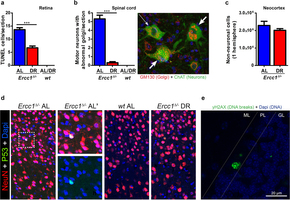Papers
Heeft u een paper die u graag onder de aandacht wilt brengen van onze leden, dan kunt u een mail sturen via de contactpagina.
Later-life mortality and longevity in late-18th and 19th-century cohort: Where are we now, and where are we heading
European Historical Population Samples Network | 31-01-2017 | Abstract The limits to human lifespan are a widely discussed topic. Yet, later-life mortality and longevity are generally studied from a genetic perspective, while the social dimension has received less attention. This paper gives a systematic overview of trends in later-life mortality and longevity for cohorts that were born in the late 18th and 19th century, and shows that the average population and the top survivors [...]
Targeted Apoptosis of Senescent Cells Restores Tissue Homeostasis in Response to Chemotoxicity and Aging
Cell | March 2017 | Abstract The accumulation of irreparable cellular damage restricts healthspan after acute stress or natural aging. Senescent cells are thought to impair tissue function and their genetic clearance can delay features of aging. Identifying how senescent cells avoid apoptosis allows for the prospective design of anti-senescence compounds to address whether homeostasis can also be restored. Here, we identify FOXO4 as a pivot in senescent cell viability. We designed a FOXO4 peptide [...]
Employing biomarkers of healthy ageing for leveraging genetic studies into human longevity
Experimental Gerontology | 29-06-2016 | Abstract: Genetic studies have thus far identified a limited number of loci associated with human longevity by applying age at death or survival up to advanced ages as phenotype. As an alternative approach, one could first try to identify biomarkers of healthy ageing and the genetic variants associated with these traits and subsequently determine the association of these variants with human longevity. In the present study, we used this [...]
Resistance Training Increases Skeletal Muscle Capillarization in Healthy Older Men
Medicine and science in sports and exercise | November 2016 | Abstract: PURPOSE: Skeletal muscle capillarization plays a key role in oxygen and nutrient delivery to muscle. The loss of muscle mass with aging and the concept of anabolic resistance have been, at least partly, attributed to changes in skeletal muscle capillary structure and function. We aimed to compare skeletal muscle capillarization between young and older men and evaluate whether resistance-type exercise training increases [...]
Expression of protocadherin gamma in skeletal muscle tissue is associated with age and muscle weakness
J Cachexia Sarcopenia Muscle | December 2016 | Abstract BACKGROUND: The skeletal muscle system plays an important role in the independence of older adults. In this study we examine differences in the skeletal muscle transcriptome between healthy young and older subjects and (pre-)frail older adults. Additionally, we examine the effect of resistance-type exercise training on the muscle transcriptome in healthy older subjects and (pre-)frail older adults. METHODS: Baseline transcriptome profiles were measured in muscle [...]
Extensive Type II Muscle Fiber Atrophy in Elderly Female Hip Fracture Patients
J Gerontol A Biol Sci Med Science | November 2016 | Abstract: Background: Sarcopenia, or the loss of muscle mass and strength, is known to increase the risk for falls and (hip) fractures in older people. The objective of this study was to assess the skeletal muscle fiber characteristics in elderly female hip fracture patients. Method:Percutaneous needle biopsies were collected from the vastus lateralis muscle in 15 healthy young women (20 ± 0.4 years), [...]
Both basal and post-prandial muscle protein synthesis rates, following the ingestion of a leucine-enriched whey protein supplement, are not impaired in sarcopenic older males.
Clinical Nutrition | September 2016 | Abstract: BACKGROUND: Studying the muscle protein synthetic response to food intake in elderly is important, as it aids the development of interventions to combat sarcopenia. Although sarcopenic elderly are the target group for many of these nutritional interventions, no studies have assessed basal or post-prandial muscle protein synthesis rates in this population.OBJECTIVE: To assess the basal and post-prandial muscle protein synthesis rates between healthy and sarcopenic older [...]
Muscle fibre capillarization is a critical factor in muscle fibre hypertrophy during resistance exercise training in older men
Journal of Cachexia, Sarcopenia and Muscle | 04-08-2016 | Abstract: Background: Adequate muscle fiber perfusion is critical for the maintenance of muscle mass, it is essential in the rapid delivery of oxygen, nutrients and growth factors to the muscle, stimulating muscle fiber growth. Muscle fiber capillarization is known to decrease substantially with advancing age. However, whether (relative) low muscle fiber capillarization negatively impacts the muscle hypertrophic response following resistance exercise training in older adults [...]
Age-related accrual of methylomic variability is linked to fundamental ageing mechanisms
Genome Biology | September 2016 | Background Epigenetic change is a hallmark of ageing but its link to ageing mechanisms in humans remains poorly understood. While DNA methylation at many CpG sites closely tracks chronological age, DNA methylation changes relevant to biological age are expected to gradually dissociate from chronological age, mirroring the increased heterogeneity in health status at older ages. Results Here, we report on the large-scale identification of 6366 age-related variably methylated [...]
Restricted diet delays accelerated ageing and genomic stress in DNA-repair-deficient mice
Nature | August 2016 | Abstract Mice deficient in the DNA excision-repair gene Ercc1 (Ercc1∆/−) show numerous accelerated ageing features that limit their lifespan to 4-6 months1, 2, 3, 4. They also exhibit a ‘survival response’, which suppresses growth and enhances cellular maintenance. Such a response resembles the anti-ageing response induced by dietary restriction (also known as caloric restriction)1, 5. Here we report that a dietary restriction of 30% tripled the median and [...]












